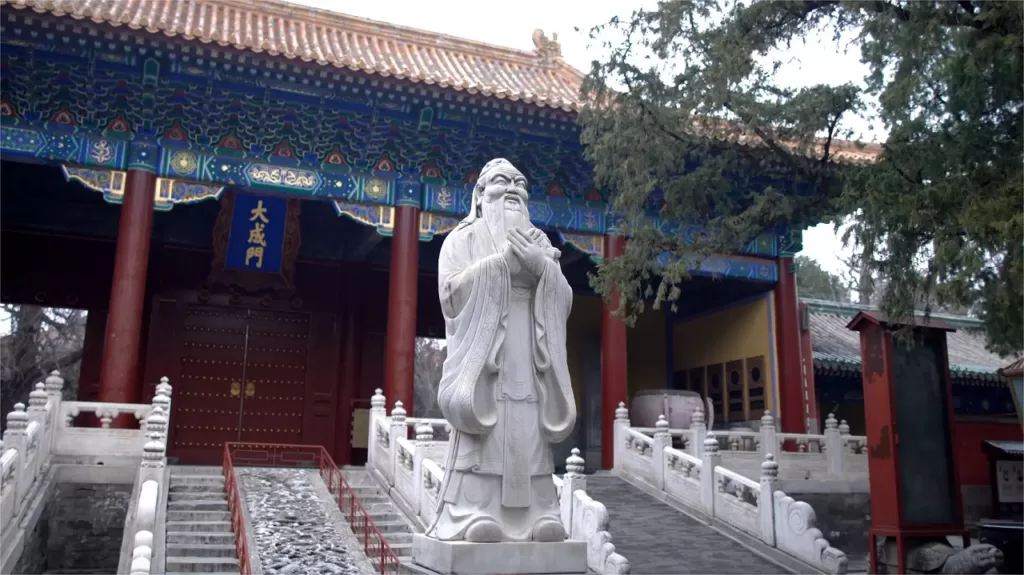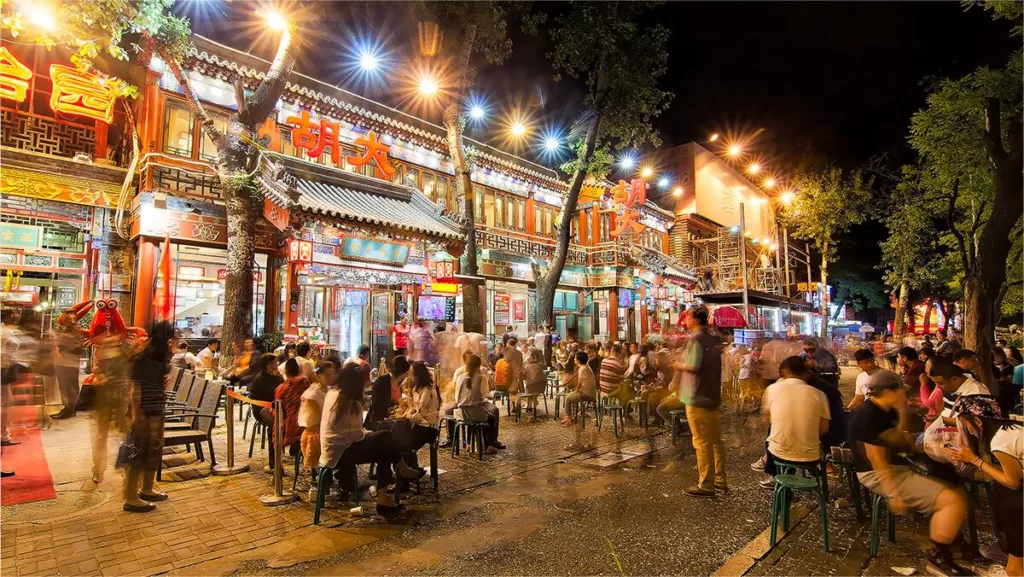Wudaoying Hutong - Billets, heures d'ouverture, points forts et conseils


Wudaoying Hutong (五道营胡同), nestled in the northern part of Beijing‘s Dongcheng District, spans a length of 632 meters with a width of 6 meters. Originally known as Wudeweiying during the Ming Dynasty, it underwent a name change to Wudaoying during the Qing Dynasty. Today, it has undergone a remarkable transformation, emerging as a trendy destination akin to the famous Nanluoguxiang, capturing the hearts of those seeking a quieter and more leisurely atmosphere compared to bustling areas like Nanluoguxiang, Yandaixie Street, and Shichahai.
Within the hutong, one encounters numerous intriguing and stylish restaurants, cafes, and small shops, predominantly owned and operated by foreigners and returnees. Many of the proprietors are directors and artists, adding a touch of high artistic flair. For the devoted artsy souls, there are opportunities to explore the cultural scene, with the facade of the three-story vegetarian restaurant designed as a picturesque ancient courtyard. Saffron, a popular Spanish restaurant in Beijing’s bourgeois circles, also draws attention. In the summer, diners can enjoy their meals in the courtyard, sipping on fruit-infused wine amidst the refreshing breeze.
Beyond the establishments lie large courtyards and residential homes. Mornings unfold with scenes of local residents, clad in slippers, stepping out to purchase tofu pudding in enamel bowls. Come evening, the atmosphere transforms as fashionable and artistic youth meander through the hutong. Visitors pedal bicycles leisurely, children playfully dig holes in sand piles, and if one is lucky, the echoes of street vendors’ calls can be heard. Wudaoying Hutong encapsulates a unique blend of modern charm and traditional Beijing life, creating a haven where past and present seamlessly coexist.
Table des matières
- Informations de base
- Localisation et transport
- Highlights of Wudaoying Hutong
- Vlog about Wudaoying Hutong
- Conseils utiles résumés à partir d'études
- Attractions near Wudaoying Hutong
Informations de base
| Durée estimée de la visite | Environ 1 heure |
| Prix du billet | Gratuit |
| Heures d'ouverture | The alley is accessible 24 hours a day, 7 days a week |
Localisation et transport
Wudaoying Hutong is located in the Dongcheng district of Beijing, China. It is situated to the east of the Drum Tower and the north of the Lama Temple, two of the city’s most popular attractions. It is easily accessible by public transportation, with several subway stations located nearby.
Bus:
- Take bus 119, 125, or 430, get off at Andingmen Stop (安定门), walk about 50 meters to the south, and you will reach the west end of the alley.
- Take bus 13, 84, 116, or 117, get off at Yonghe Lama Temple (雍和宫), and you will be standing at the east end of the alley.
Métro :
- Take subway line 2 or 5 and get off at Yonghe Lama Temple
- Take subway line 2 and get off at Andingmen Stop.
Highlights of Wudaoying Hutong
Cafe and Restaurants

Wudaoying Hutong is home to a diverse range of cafes and restaurants, offering a variety of cuisines to suit all tastes. Visitors can enjoy traditional Chinese dishes, such as dumplings and noodles, as well as international cuisine, including Italian and Japanese food. Many of the eateries offer outdoor seating, creating a relaxing and enjoyable atmosphere for diners. The hutong also has several trendy cafes serving specialty coffee and homemade desserts. Some of the most popular cafes and restaurants in Wudaoying Hutong include Moka Bros, Slow Boat Brewery Taproom, Café Zarah, and Ramo.
Boutiques

Wudaoying Hutong is known for its eclectic mix of boutique shops, selling unique and stylish items ranging from clothing and accessories to home decor and gifts. Visitors can find vintage clothing at “Bowl Full of Rice,” handmade pottery at “POTTERY GUT,” and handcrafted jewelry at “Plastered 8.” For those looking for souvenirs or gifts, there are shops such as “The Beast Shop,” which sells Chinese-inspired t-shirts and “Wuhao Curated Shop,” which offers a selection of modern and traditional Chinese crafts. Many of the shops are independently owned and offer a personalized shopping experience.
Temple of Earth

The Temple of Earth, also known as Ditan Park, is an ancient temple located at the northern end of Wudaoying Hutong in Beijing, China. The temple was first built in 1530 during the Ming Dynasty and was used to offer sacrifices to the God of Earth. It is one of the largest temples in Beijing, covering an area of 42.7 hectares. The temple complex includes several halls, altars, and gardens, with beautiful traditional Chinese architecture and decorations. Visitors can explore the temple’s history and culture, enjoy a peaceful walk in the gardens, and participate in traditional events and festivals.
Vlog about Wudaoying Hutong
Conseils utiles résumés à partir d'études
Meilleur moment pour visiter : It’s recommended to visit Wudaoying Hutong in the late afternoon. This timing allows for a more leisurely exploration of the shops and cafes. As you make your way to Wudaoying Hutong, you’ll pass by attractions like Yonghe Temple and the Confucius Temple, enhancing your overall experience.
Shop Policies: Be mindful of the policies of individual shops. Some establishments may prohibit entry for children, while others may have restrictions on photography. Look for signage at the entrance to determine if there are any specific rules you need to follow.
Late Opening Hours: Many shops in Wudaoying Hutong open after 11:00 AM, so there’s no need to rush in the morning. Take your time to enjoy a relaxed start to your day before heading out to explore the area.
Safety Considerations: Keep in mind that the hutong’s lanes can be narrow, and electric scooters occasionally pass through. Exercise caution while taking photos to ensure your safety and that of others around you.
Attractions near Wudaoying Hutong

Guozijian - la plus haute institution éducative de la Chine ancienne

Temple de Confucius de Pékin - le deuxième plus grand temple confucéen

Ghost Street – a captivating culinary destination

Temple de Yonghe Lama - un temple bouddhiste tibétain